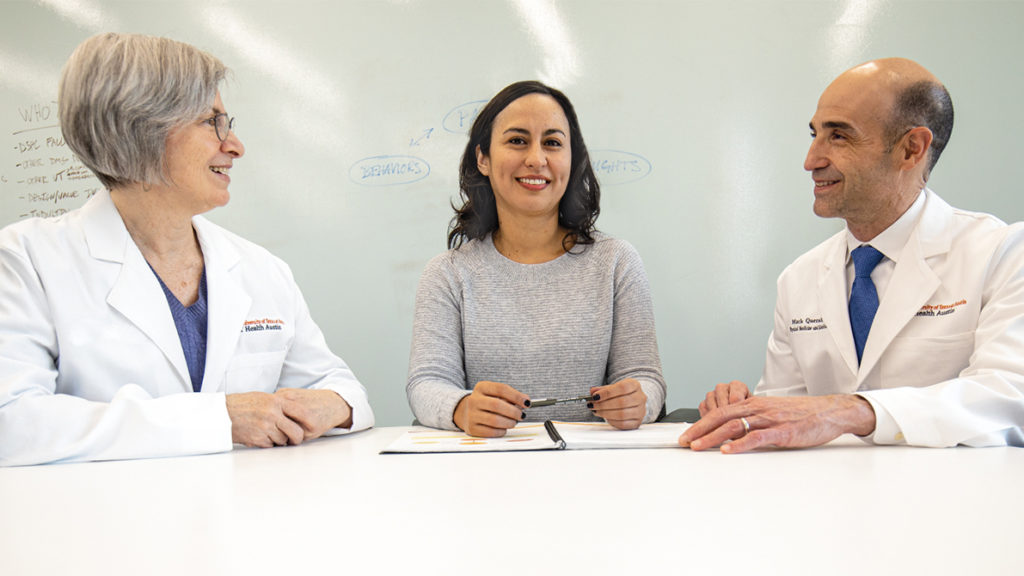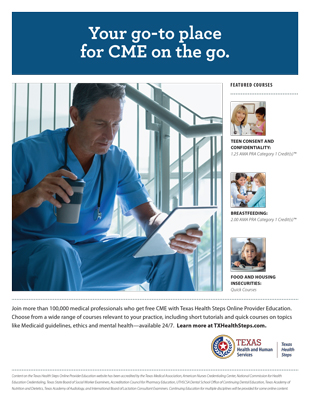
A first-of-its-kind Department of Health Social Work reflects medicine’s need to see the whole person — and the whole system.
BY Hannah Jane Collins
“Build a workforce to integrate social care into health delivery.”
That’s one of the top directives in an October report from the National Academies of Sciences, Engineering and Medicine (NASEM). After 18 months of gathering evidence on how to incorporate social determinants of health into care delivery, the committee concluded that social work is what sets the foundation for improving the health of the whole person.
Enter the Department of Health Social Work at Dell Medical School at The University of Texas at Austin, established early this year as the first of its kind at a U.S. medical school. A collaboration with the Steve Hicks School of Social Work, the department creates an academic home for social workers in health settings — and builds on interprofessional health professions training that places social work students side-by-side with medical, nursing and pharmacy students.
“Interprofessional health training has been a focus of Dell Med since it opened,” says Barbara Jones, Ph.D., MSW, inaugural chair of the Department of Health Social Work. “It started with the Foundations of Interprofessional Collaborative Practice Course, a collaboration between Dell Med, the Steve Hicks School, the College of Pharmacy and the School of Nursing. This course brings together faculty and students from the health professionals schools at UT Austin to work and learn together.”
The course set the stage for the 2017 launch of the Center for Health Interprofessional Education and Practice, which expands interprofessional learning to the entire UT Austin campus.
“The health social work piece of that puzzle is now solidified with a department within the medical school itself, allowing us to begin demonstrating the ideal relationship we see between social care and medicine,” Jones says.
The structure of the department reflects the need for social work as a building block of interprofessional health teams: Licensed social workers embedded in teams across the Dell Med enterprise — clinical social workers, researchers, administrative directors and program managers — are all members of the department as well as their own individual units. They also qualify for faculty appointments at the Steve Hicks School.
“The whole premise of the NASEM report this fall is that social care is just as, if not more, critical than physical health care,” says Robyn Golden, LCSW, the associate vice president of population health and aging at Rush University Medical Center. Golden was one of the 18 committee members who contributed to NASEM’s October report. “You can’t do one without the other, and the best way is with interprofessional teams. You can’t do it without social work.
“A reflection of that principle is to have a department in a medical school itself, and it’s remarkable that at UT Austin, it did not just come from the school of social work.”
With the implementation of a first-of-its-kind health social work department at Dell Medical School at The University of Texas at Austin, exciting changes are happening. For the first time, future doctors and future social workers will be sitting in some of the same classes and working together at a training level.
Social Work Today, “Medicine Joins Forces With Social Work — Blueprint for the Future”
Uniting Care for the Mind & the Body
Before she arrived at the Musculoskeletal Institute at UT Health Austin — the clinical practice of Dell Med — Cynthia Corral, LCSW, had gained experience all over Austin. She worked as a medical social worker at Ascension Seton, CommUnityCare and Integral Care — three of the city’s major care providers for both insured and uninsured populations.
Now at UT Health Austin, Corral and fellow social workers provide mental health care, which is typical of a licensed clinical social worker — but less common is the degree to which they provide care coordination for patients. Working closely together with the benefit of a shared academic home, the social work team can more easily pinpoint common themes and opportunities for care teams to improve — and as an assistant professor of practice at the Steve Hicks School, Corral can also train students to provide this level of care.
One example? Corral and her teammates noticed that many chronic pain patients arrived at the clinic having experienced complex traumas in their lives — physical or sexual abuse, a history of incarceration or difficulty immigrating to the U.S., for example.
“The more you experience pain, the more attuned to it you are — it’s a fight-or-flight response, which is exactly what’s experienced with trauma,” Corral says. “The physical pain symptoms can become exacerbated as a result. As a team, we’re learning to be more sensitive to post-traumatic stress disorder, and to find ways that we can help.”
As a result, Corral and other social workers trained in cognitive processing therapy, a treatment for post-traumatic stress disorder (PTSD) which has been shown to clinically reduce PTSD symptoms in patients over time.
Having social workers play a direct role in patient care this way is part of what makes UT Health Austin’s patient-centered approach work as effectively as it does, says Karl Koenig, M.D., medical director of the Musculoskeletal Institute.
“Social workers fill in the gaps and see aspects of the patient that physicians and specialists simply cannot — they make me a more complete orthopaedic surgeon, and make us a more complete team,” Koenig says. “Our clinical outcomes in the Back and Neck Pain Center are some of the best I’ve ever seen — 65% of patients report improvement within six months. The combined approach there includes doing cognitive behavioral therapy and incorporating social workers in the coordination of follow-up care. Having that touchpoint leads to massively improved outcomes, including things like fewer unnecessary ER visits.”
‘Social Workers All Look Different’
The benefits of a multidisciplinary team in the context of patient care are clear, but a less obvious setting where social work — and interprofessional practice more broadly — makes a difference? Research.
Shadia Lahlou, LMSW, MPH, is a research project manager in the departments of Oncology and Internal Medicine. A graduate of the Steve Hicks School of Social Work, she is currently coordinating the launch of a pilot study in partnership with Texas Oncology that is focused on improving support for patients with breast cancer who are faced with difficult decision-making around their surgical treatment and reconstructive options.
Following the creation of the Department of Health Social Work, Lahlou is now an associate professor of practice at the Steve Hicks School, where she has more opportunities to collaborate with others who share her background — and she can offer guidance to current social work students on opportunities to impact health through research.
“People are often surprised to hear about the work I’ve gone into, or think that you have to have an M.D. or Ph.D. to do clinical research,” Lahlou says. “Social workers all look different and work to improve their communities in diverse ways. When I apply my social work and public health skillset, I can bring a macro lens to the work that focuses on individuals in their lived environment. This helps with effective translation of studies to the real world.”
A Framework of Social Justice
If you ask Jesús Ortega, LMSW, a medical school like Dell Med can’t properly serve community members and patients if the culture of the school itself is not built on a foundation of equity.
As director of Dell Med’s Office of Diversity, Equity and Inclusion, Ortega seeks to be part of building that foundation. He works with Dell Med’s faculty and staff on workplace bias and pursuing equity in their own work — and the opportunities to create a more equitable health system are numerous, from hiring decisions to addressing bias in patient care and more.
Ortega also now holds an assistant professor of practice appointment at the Steve Hicks School, which enables him to be a faculty facilitator for the Foundations Course, where he works with Jones to teach health professions students how to recognize and reduce implicit bias to improve care.
“Social workers are, by default, trained on a foundation of social justice and equity,” Ortega says. “It’s that lens that allows me to have a broader effect on health than one-on-one case management; I can bring my expertise to work that focuses on inclusivity and understanding by all professionals who touch a person’s health.”





